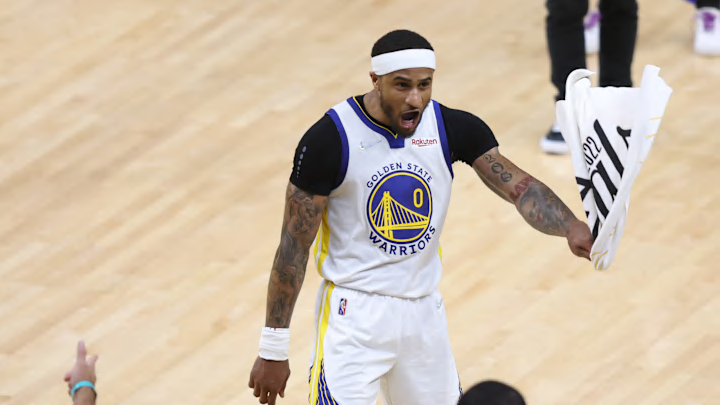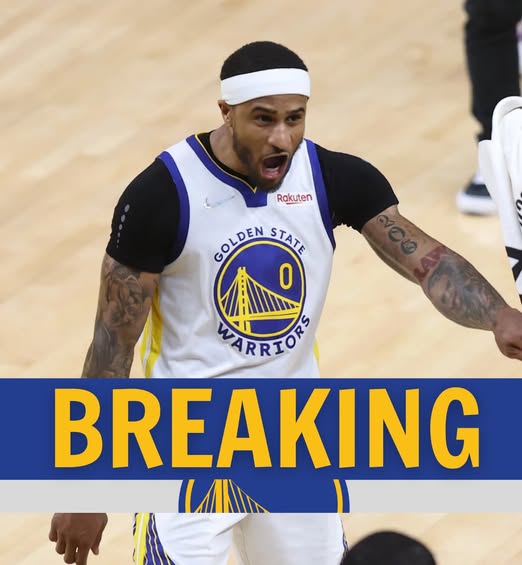As the Golden State Warriors head into a pivotal offseason, the franchise faces critical decisions about veterans Gary Payton II and Kevon Looney, both of whom are set to become free agents after fulfilling their three-year contracts. At 32 and 29 years old, respectively, Payton and Looney are likely seeking one last significant payday. However, their limited roles on a Warriors team desperate to bolster its offense next season may not justify hefty contracts—at least not in Golden State’s traditional salary structure.

But what if the Warriors could turn these beloved veterans into something far more valuable than their on-court contributions? Enter a bold, high-risk strategy that could either cement Golden State’s championship aspirations or unravel their dynasty entirely: transforming Payton and Looney into human trade exceptions.
The Radical Plan: Inflated Contracts as Trade Chips
The idea, floated by CBS Sports’ Sam Quinn on a recent episode of Third Apron, is as audacious as it is intriguing. Instead of letting Payton and Looney walk or re-signing them to modest minimum deals, the Warriors could leverage their Bird rights to offer the duo inflated one-year contracts—potentially in the $8-10 million range. These oversized, expiring deals would serve as valuable trade assets, allowing Golden State to navigate the NBA’s restrictive second tax apron rules, which prohibit teams from aggregating salaries in trades.
“Re-sign Kevon Looney and Gary Payton II to big one-year deals,” Quinn proposed. “At the trade deadline, you can flip those guys for other players who make less, using draft assets to sweeten the deal.”
By inflating Payton and Looney’s contracts, the Warriors could effectively create “human trade exceptions”—players whose salaries act as placeholders to match incoming talent in trades without needing to combine multiple contracts. Once the duo becomes trade-eligible, Golden State could package their contracts with draft picks to acquire players who better fit the team’s needs, such as offensive firepower to complement Stephen Curry’s prime.
The Upside: A Masterstroke for Flexibility
This strategy could be a game-changer for a Warriors team stuck in a financial straitjacket. Operating above the second tax apron limits roster flexibility, but big, expiring contracts for Payton and Looney would give Golden State a workaround. At the trade deadline, they could target players on smaller salaries, using their draft capital to facilitate deals that reshape the roster for a championship push.
Payton, a defensive dynamo, and Looney, a reliable rebounder and screen-setter, are respected veterans whose expiring deals could appeal to rebuilding teams looking to shed long-term salary or acquire picks. If executed correctly, this move could allow the Warriors to stay competitive while managing their luxury tax burden, keeping the dynasty alive for another run.
The Downside: A Gamble Fraught with Peril
However, this plan is not without significant risks. Handing out $8-10 million contracts to players whose on-court value likely warrants far less is a gamble that could backfire spectacularly. Several variables could derail the strategy:
Player Performance: If Payton or Looney underperform or suffer injuries, their trade value could plummet, leaving the Warriors stuck with overpaid contracts and no viable market.
Team Success: If Golden State struggles early in the season and falls out of contention by January or February, the rationale for being a second-apron team evaporates. In that scenario, the Warriors might be forced to use draft picks just to dump Payton and Looney’s contracts, rather than acquiring talent.

Emotional Attachments: The Warriors’ loyalty to their championship core is well-documented. Both Payton and Looney are beloved figures who contributed to the 2022 title. This season, Golden State held onto both players past the trade deadline despite their expiring contracts. Will the front office have the stomach to trade these fan favorites when push comes to shove?
The Philadelphia 76ers provide a cautionary tale. Last offseason, they re-signed KJ Martin to an inflated deal with a similar “human trade exception” strategy in mind. When the plan fizzled, Philadelphia had to surrender two second-round picks to offload Martin’s contract to the Detroit Pistons. For a Warriors team already thin on draft capital, a similar misstep could be catastrophic.
A Make-or-Break Offseason
The Warriors’ decision on Payton and Looney will be a litmus test for their front office’s vision and risk tolerance. Playing it safe by re-signing the duo to minimum deals preserves roster continuity but does little to address Golden State’s offensive shortcomings. On the other hand, embracing Quinn’s radical strategy could unlock the flexibility needed to retool around Curry, Klay Thompson, and Draymond Green—but at the cost of significant financial and emotional risk.
As free agency looms, the Warriors stand at a crossroads. Will they double down on their championship pedigree with a bold, unconventional move, or will they play it safe and risk fading into irrelevance? One thing is certain: the choices made this summer could determine whether Golden State’s dynasty roars back to life or crumbles under the weight of its own ambition